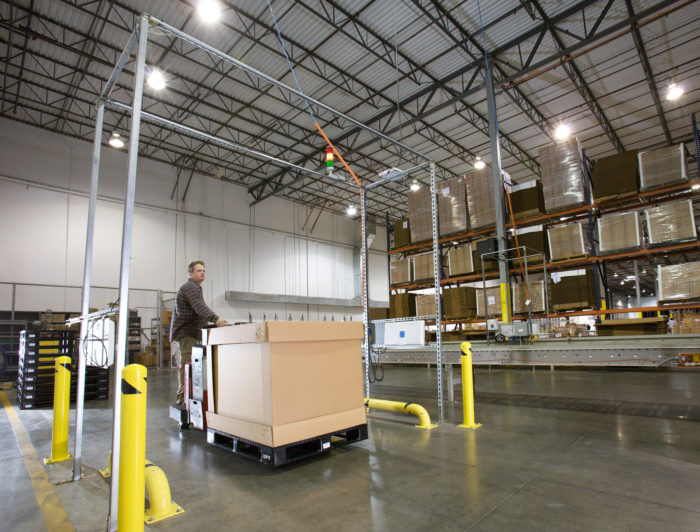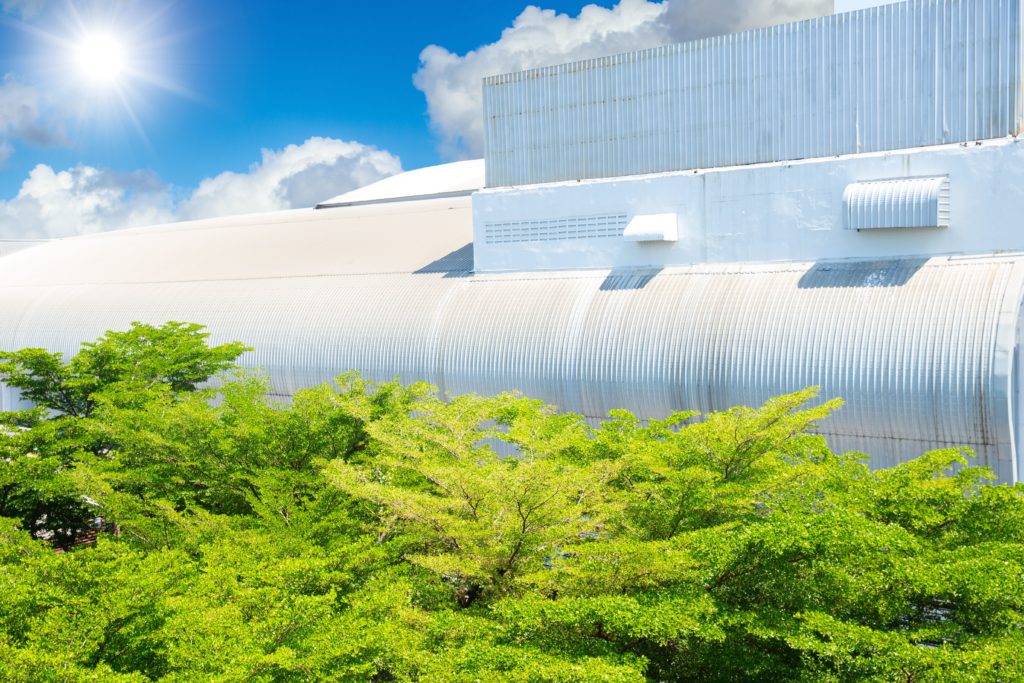Most major supply chains today are seeking to make their practices more environmentally responsible. From UPS’ use of alternative, energy-efficient vehicles to Amazon’s installation of solar panels on the rooftops of fulfillment centers, all of these efforts help to reduce the impact the big companies have on the environment.
Environmentally friendly logistics strategies like these shrink a company’s carbon footprint while also lowering their Total Cost of Business (TCOB). Effectively using warehouse and truck space, controlling energy usage, and adopting policies that reduce waste are all central to green supply chain management. Supply chain managers who wish to follow suit can make some simple changes in their warehouses and transportation practices to lessen their environmental impact.
Adopting Green Policies in the Warehouse
 Large warehouses require a significant energy supply for heating, cooling, and lighting. Improving warehouse efficiency requires reconsidering how the building’s space and energy are being used and looking for ways to make the most of these two resources. Here are a few ways to get started:
Large warehouses require a significant energy supply for heating, cooling, and lighting. Improving warehouse efficiency requires reconsidering how the building’s space and energy are being used and looking for ways to make the most of these two resources. Here are a few ways to get started:
- Use energy-efficient LED lighting: Companies that switch from using metal halide lighting to LED fixtures could save up to 20 percent on their total electricity usage. Adding “smart” lighting controls such as motion detectors to the mix can increase energy savings even further by ensuring that lights are only on when an area is in use.
- Take advantage of vertical space: In many warehouses, vertical space goes empty, meaning that energy is being used to heat and light the upper part of a warehouse even when that space is not being used to store products or equipment. Managers should consider adding a mezzanine that creates a second floor for storage. High-density automated racking systems can also make use of vertical warehouse footage. In addition, renting pallets, as opposed to maintaining an internal fleet, allows warehouse managers to regain room on the warehouse floor since it does away with the need to store extra pallets for periods of high demand.
- Invest in rooftop solar panels: The extensive square footage of a warehouse roof can be an excellent opportunity to capture solar energy. Amazon recognized this when they began investing in rooftop solar panel systems for fulfillment centers in 2017. Since then, they’ve installed these panels on 50 roofs, giving the company a total of 98 megawatts of capacity. As much as 80 percent of the energy needs of a facility can be produced by the panels, according to reports from the company.
A warehouse is just a single point in the supply chain.
By working toward these upgrades, warehouse managers can make a commitment to reduce the carbon footprint of their operations and even cut overall costs. However, a warehouse is just a single point in the supply chain. There are many other opportunities to reduce the environmental impact of logistics as products make the journey between producers, warehouses, and retailers.
Environmentally Friendly Logistics Practices in Transportation
 Transportation is the largest contributor to greenhouse gas emissions in the U.S., causing about 29 percent of the 6,457 million metric tons of CO2 emissions released in 2017. When supply chain managers seek ways to stem this tide of emissions, they also save on the total cost of transportation, including fuel, truck maintenance, and driver salaries. To enjoy the benefits of more efficient transportation, supply managers can:
Transportation is the largest contributor to greenhouse gas emissions in the U.S., causing about 29 percent of the 6,457 million metric tons of CO2 emissions released in 2017. When supply chain managers seek ways to stem this tide of emissions, they also save on the total cost of transportation, including fuel, truck maintenance, and driver salaries. To enjoy the benefits of more efficient transportation, supply managers can:
- Leverage a route-planning system: Route-planning software can be used, in conjunction with GPS and other real-time road data, to find the most efficient travel routes for trucks in order to limit fuel usage. This type of software could, for example, create a route that allows a single truck to make multiple stops in a way that eliminates the need for multiple trucks and trips. It might also be used to avoid common drains on fuel, like areas of traffic congestion and steep inclines.
- Lighten the load: Choosing a more efficient shipping pallet is an excellent way to lower the weight of a shipment without reducing the amount of product being transported. Multi-use wood block pallets can weigh up to eighty pounds and make up a large portion of the total weight of a truckload. Plastic pallets, on the other hand, can hold just as much inventory but weigh less than 50 pounds. By switching to plastic, managers can reduce the total weight of their load (for shipments that cube out) and cut back on fuel consumption.
- Eliminate unnecessary trips: While a route-planning system can help make delivery routes more efficient, another common transportation inefficiency occurs when managing empty shipping pallets. Reusable pallets need to be picked up from the retailer or when they reach the end of their journey, which not only increases carbon emissions and transport costs, but also creates a logistical nightmare. Plastic pallet pooling eliminates extra transport legs by putting the responsibility for empty pallets in the hands of the pooling company. Since a pallet pooling service has a network of clients, they can efficiently move pallets within their network of customers. Meanwhile, plastic pallets require less transportation than wood platforms overall, since they rarely need to be taken to depots for repair.
Plastic pallet pooling streamlines and minimizes the necessary trips to clean, repair, and return pallets.
Pooled plastic pallets have positive effects throughout the supply chain, making the switch to plastic pallets a simple way to build an environmentally friendly logistics system. Plastic platforms are lighter to transport and easier to clean; they’re also stackable, rackable, and automation friendly, so they make efficient use of vertical space. Meanwhile, plastic pallet pooling streamlines and minimizes the necessary trips to clean, repair, and return pallets to the beginning of the supply chain. These factors make pooled plastic pallets a crucial part of adopting eco-friendly processes and reducing your supply chain’s impact on the environment.
iGPS plastic pallets can help support environmentally friendly logistics strategies that protect the planet and reduce your TCOB. For more information, contact us at 1-800-884-0225, email a specialist at switch@igps.net, or visit our contact page.



